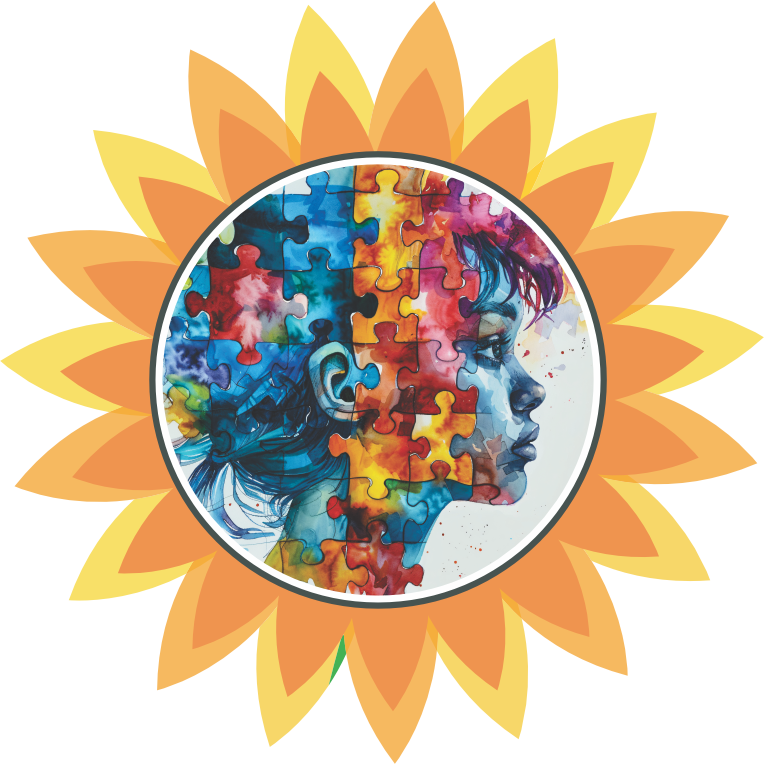The exact cause (or causes) of autism isn’t fully understood, but researchers believe it’s likely due to a combination of genetic and environmental factors. Here’s what we know:
- Genetic factors: There is evidence to suggest that certain genes may increase the risk of autism.[1],[2] However, it’s important to note that autism is not caused by a single gene or genetic mutation. Instead, it’s thought to involve a complex interplay of multiple genes, and many epigenetic changes (see Chapter 11) are also implicated. There are genetic syndromes which cause symptoms similar to autism.
Studies, including those on twins, suggest that autism has a strong genetic basis, with a 60% likelihood of autism occurring in both twins (identical) if one is diagnosed with the disorder; fraternal twins had a 0% likelihood.[3] We will discuss these factors in more detail in the next chapter ‘Is autism genetic or hereditary?’
- Environmental factors: Environmental influences during prenatal, perinatal, and early postnatal development may also contribute to the development of autism. These factors include exposure to certain toxins, maternal infections during pregnancy, and complications during childbirth, among many others.
- Brain development: Autism is believed to involve differences in brain development, particularly in areas related to communication, social interaction, and sensory processing.[4],[5] These differences may affect how information is processed and how individuals with autism perceive and interact with the world around them. There is evidence to suggest that abnormal growth rates in specific brain areas during early childhood might be linked to autism.
- Immune System Dysfunction: Some studies have suggested that abnormalities in the immune system may play a role in the development of autism.[6] Immune system dysfunction could potentially lead to inflammation or other processes that affect brain development.
- Other Factors: Other factors such as advanced parental age, maternal health conditions (such as gestational diabetes or obesity), and certain medications taken during pregnancy have also been investigated for their potential links to autism.
The most important of these other factors include:
- Vaccination: Anecdotal evidence has linked autism to childhood vaccination, especially MMR. The role of vaccination has been implicated in regressive autism, where the child seems to have normal development until the age of 16-18 months and then becomes autistic.
- Pesticides/Herbicides: The increasing use of biologically- active and potentially carcinogenic pesticides and herbicides is also implicated in the higher prevalence of autism.
- Radiation: Mobile tower radiations are also known to affect neural development in lab animals. The rate of increase in mobile penetration has been correlated to the increase in autism.[7],[8]
- Maternal Stress During Pregnancy: Maternal stress is known to affect the development of an unborn child. There is some research suggesting a potential correlation between maternal stress during pregnancy and the risk of autism spectrum disorder in children.[9],[10],[11] Some studies suggest that biological responses to stress, such as elevated levels of stress hormones like cortisol, may affect fetal brain development. This could potentially influence the likelihood of ASD. Research indicates that stress during certain stages of pregnancy might have different impacts on the development of the nervous system. It’s also suggests that stress may interact with other factors, such as genetic predispositions, environmental exposures, or health conditions of the mother, which together could increase ASD risk.
These factors need more research and human trials for a definitive answer.
Did I do something to cause my child’s autism?
I often get parents who feel guilty about their children having autism. They often blame themselves or sometimes each other. While individual factors like stress during pregnancy, any infection, and treatment taken during pregnancy can have some bearing on the healthy development of a child, in most cases the causes are too universal to blame yourself for having an autistic child.
We don’t know for sure what is causing this disease but we do know that it has become an epidemic, it is global in prevalence, and it has significantly increased in the past 30 years – and continues to increase. The forces that might be responsible for it have to be universal and should have the potential to affect the neural development of a foetus. It could be mobile radiation, some organic compounds like pesticides and herbicides, plastics, or some seemingly innocuous conventional medicine that a lot of people take (such as paracetamol, sold as Crocin/Calpol/Dolo/Panadol/Tylenol, or anti-emetic drugs) during pregnancy. The fact is, we don’t know for sure yet.
The one thing we do know is that it is usually beyond the control of individual parents. So, don’t blame yourself for it…ever!
Somebody might ask, if the cause is universal, why is it not affecting every child? I believe the answer to this question lies in the degree of exposure, our genetic variability, and genetic susceptibility.
[1] Ruzzo EK et al. Inherited and De Novo Genetic Risk for Autism Impacts Shared Networks. Cell. (2019) 178 (4):850–66 e26.
[2] Satterstrom, F. K et al. Large‐scale exome sequencing study implicates both developmental and functional changes in the neurobiology of autism. Cell (2020) 180(3), 568–584.e523.
[3] Tick B, et al. Heritability of autism spectrum disorders: A meta-analysis of twin studies. J. Child Psychol. Psychiatry (2016) 57:585–595.
[4] Lee JK et al. Altered development of amygdala-connected brain regions in males and females with autism. J Neurosci. (2022) 42(31):6145–6155.
[5] Donovan AP, Basson MA. The neuroanatomy of autism-a developmental perspective. J Anat. (2017) 230:4-15.
[6] Ellul, P. et al. Regulatory T lymphocytes/Th17 lymphocytes imbalance in autism spectrum disorders: evidence from a meta-analysis. Molecular Autism (2021) 12, 68.
[7] Martha R. Herbert, Cindy Sage, Autism and EMF? Plausibility of a pathophysiological link – Part I, Pathophysiology (2013),Vol 20,Issue 3,191-209.
[8] Physicians for Safe Technology. Cell tower radiation health effects. Available at https://mdsafetech.org/cell-tower-health-effects/ (accessed: 9 Jun 2024)
[9] Van den Bergh BRH et al. Prenatal developmental origins of behavior and mental health: The influence of maternal stress in pregnancy. Neurosci Biobehav Rev. (2020) 117:26-64.
[10] Usui N, Kobayashi H, Shimada S. Neuroinflammation and Oxidative Stress in the Pathogenesis of Autism Spectrum Disorder. Int J Mol Sci. (2023) 24(6):5487.
[11] Han VX, Patel S, Jones HF, Dale RC. Maternal immune activation and neuroinflammation in human neurodevelopmental disorders. Nat Rev Neurol. (2021) 17(9):564-579.


